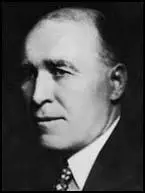William Lemke

William Lemke, the son of a prosperous farmer, was born in Albany, Minnesota, on 13th August, 1878. After graduating from the University of North Dakota in 1902 he studied law at Georgetown University, Washington and was admitted to the bar in 1905.
Lemke worked as a lawyer in Fargo, North Dakota. During the First World War he became a member of the national executive committee of the National Nonpartisan League. A member of the Republican Party he was elected to the House of Representatives in 1932.
Although a Republican, Lemke supported Franklin D. Roosevelt in his campaign to become president. He became disillusioned with Roosevelt and his New Deal and remarked: "I look upon Roosevelt as a bewildered Kerensky of a provisional government. He doesn't know from or where he's going."
In May 1935 Father Charles Coughlin began having talks with Huey Long, Francis Townsend, Gerald L. K. Smith, Milo Reno and Floyd B. Olson about a joint campaign to take on President Franklin D. Roosevelt in the 1936 presidential elections. Long was expected to the candidate but he was assassinated on 8th September, 1935.
The following year Coughlin's National Union of Social Justice selected Lemke as the party's candidate, but he won only 882,479 votes compared to Franklin D. Roosevelt (27,751,597) and Alfred Landon (16,679,583). Lemke polled 13 per cent of the vote in North Dakota but less than 6.5 per cent in other areas such as Massachusetts, Minnesota, Ohio, Wisconsin, Illinois, Michigan and Pennsylvania, where he was expected to do well.
After losing his seat in the Senate in 1940, Lemke returned to Fargo and worked as a lawyer. Lemke was elected to Congress in 1942 and served from January 1943 until his death on 30th May 1950.
Primary Sources
(1) Charles Coughlin, Principles of the National Union of Social Justice (1936)
Establishing my principles upon upon this preamble, namely, that we are all creatures of a beneficent God, made to love and serve Him in this world and to enjoy Him forever in the next; and that all this world's wealth of field and forest, of mine and river has been bestowed upon us by a kind Father, therefore, I believe that wealth as we know it originates from the natural resources and from the labor which the sons of God expend upon these resources. It is all ours except for the harsh, cruel and grasping ways of wicked men who first concentrated wealth into the hands of a few, then dominated states and finally commenced to pit state against state in the frightful catastrophes of commercial warfare.
With this as a preamble, then, these following shall be the principles of social justice towards whose realization we must strive.
1. I believe in the right of liberty of conscience and liberty of education, not permitting the state to dictate either my worship to my God or my chosen avocation in life.
2.1 believe that every citizen willing to work and capable of working shall receive a just and living annual wage which will enable him to maintain and educate his family according to the standards of American decency.
3. I believe in nationalizing those public necessities which by their very nature are too important to be held in the control of private individuals. By these I mean banking, credit and currency, power, light, oil and natural gas and our God-given natural resources.
4. I believe in private ownership of all other property.
5. I believe in upholding the right to private property yet in controlling it for the public good.
6. I believe in the abolition of the privately owned Federal Reserve Banking system and in the establishment of a Government owned Central Bank.
7. I believe in rescuing from the hands of private owners the right to coin and regulate the value of money, which right must be restored to Congress where it belongs.
8. I believe that one of the chief duties of this Government owned Central Bank is to maintain the cost of living on an even keel and the repayment of dollar debts with equal value dollars.
9. I believe in the cost of production plus a fair profit for the farmer.
10. I believe not only in the right of the laboring man to organize in unions but also in the duty of the Government which that laboring man supports to facilitate and to protect these organizations against the vested interests of wealth and of intellect.
11 . I believe in the recall of all non-productive bonds and thereby in the alleviation of taxation.
12. I believe in the abolition of tax-exempt bonds.
13. I believe in the broadening of the base of taxation founded upon the ownership of wealth and the capacity to pay.
14. I believe in the simplification of government, and the further lifting of crushing taxation from the slender revenues of the laboring class.
15. I believe that in the event of a war for the defense of our nation and its liberties, there shall be a conscription of wealth as well as a conscription of men.
16. I believe in preferring the sanctity of human rights to the sanctity of property rights. I believe that the chief concern of government shall be for the poor because, as it is witnessed, the rich have ample means of their own to care for themselves.
These are my beliefs. These are the fundamentals of the organization which I present to you under the name of the NATIONAL UNION FOR SOCIAL JUSTICE. It is your privilege to reject or accept my beliefs; to follow me or repudiate me.
